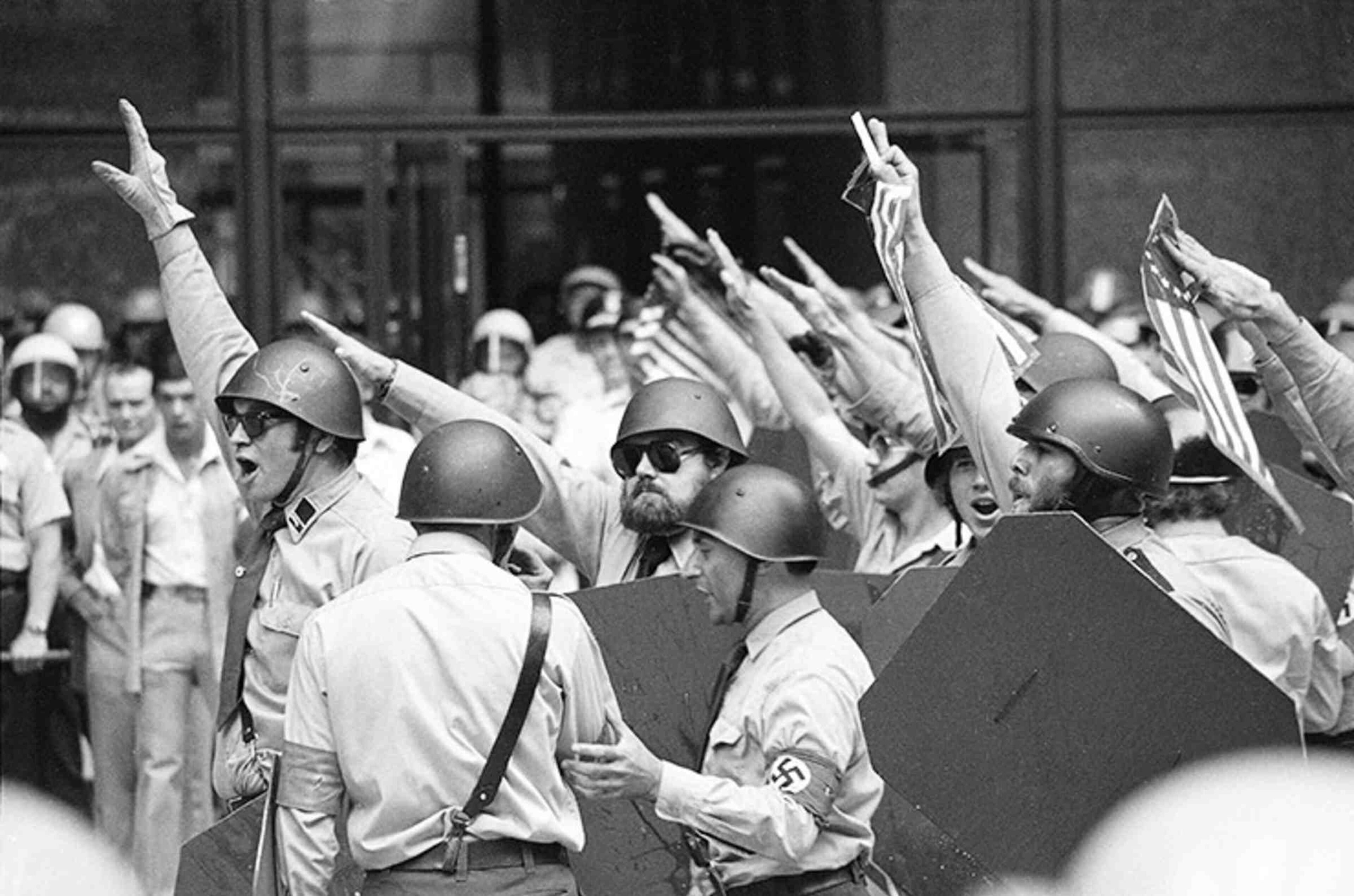OPINION: Nazis invade Cobb County. Campaign backfires.

As a gaggle of Florida (and Georgia) neo-Nazis trolled a Cobb synagogue last weekend, I thought of a scene from an American comedy classic: The Blues Brothers.
A pack of uniformed neo-Nazis stand heil-Hitlering on a bridge in a Chicago park as protestors shout at them. In the background, in their battered Dodge sedan, Jake and Elwood Blues eye the situation with scorn.
“I hate Illinois Nazis,” growls Jake. Elwood nods, steps on the gas and barrels towards the brown shirts who dive into the water to save themselves.
The audience, of course, loved it. Who doesn’t like seeing shamed, frightened and wet stormtroopers?
It was the ultimate rejection — mockery, with a side order of derision.
The movie’s Nazis were patterned from real life. A group of them had holed up for years in a building not far from the Southwest Chicago neighborhood where I grew up.
The neighborhood, a working class community of largely Eastern European immigrants, didn’t embrace the Nazis. But they didn’t run them out, either. The white-supremacists’ anti-Black message held sway with enough residents who were afraid their neighborhood was headed for racial change.

That’s always the threat with these groups. No matter how odious and pathetic these losers are, they often spout issues — like crime or immigration — that incite worry and sometimes connects them with “normal” people.
The Chicago Nazis made big news when they threatened to march in Skokie, a predominately Jewish suburb which then (the late 1970s) had thousands of Holocaust survivors. Their court case was a First Amendment argument which was picked up by the ACLU, went to the U.S. Supreme Court and largely prevailed. Ultimately, they decided to rally in Chicago instead.
Later, the group’s leader, Frank Collin, was nabbed on child molestation charges and the group fell apart.
So much for the “master race.”
Last Saturday, a small party of miscreants unfurled two red flags with swastikas and shouted some garbage outside of Chabad of Cobb as the synagogue’s congregation worshiped inside. The group was led by Florida neo-Nazi Jon Minadeo II, a one-time rapper who came to the conclusion that his talents were better suited to spewing slime.
Minadeo was arrested the previous night in Macon, where his merry band employed similar tactics outside a synagogue. It was a “tour” of Georgia for Minadeo, who runs something called the Goyim Defense League, a tiny clique bent on spreading the word that Jews run the world.

Minadeo, who puts out Hitler-saluting videos online, has been behind the recent distribution of antisemitic leaflets around Atlanta suburbs. The campaign is apparently part of Minadeo’s “business model” that builds enthusiasm, and, he hopes, some contributions to his efforts.
The leafletting has caused the number of antisemitic incidents in Georgia to increase 63% from 2021 to 2022, according to Eytan Davidson, regional director of the Anti-Defamation League.
In recent months, the newspaper has gotten many reports of the flyers but we’ve tried not to play into their hands and give them free publicity.
It’s a an age-old question in dealing with fringe nutjobs: Do you ignore them and hope they dry up? Or loudly denounce them and maybe give them the oxygen they crave?
Esther Panitch, a state rep who is the only Jewish legislator (out of 236 in Georgia), agrees there’s a “fine line” but would prefer to hammer them however you can. Legally, that is. She’s a lawyer, after all.
“The Jewish community knows this is going on all the time; the non-Jewish community doesn’t,” she said. “We go to synagogue with armed guards. This is our new normal.”
Panitch was behind an antisemitism statute that died in the legislature because of differences how antisemitism would be determined. It would have acted like hate-crime legislation where stiffer penalties could come in the commission of a crime.
“There has been this idea of Jews staying quiet (in Georgia), but what has it gotten us?” she told me. “Maybe giving them attention is what we want to do. We have to alert the community that they are here.”
“They’ve been validated by people, by some of the highest levels of government,” Panitch added. “We have to call it out quickly or we’ve committed a moral failure.”

Chabad of Cobb Rabbi Ephraim Silverman, whose synagogue carries the motto “Judaism with a smile,” prefers to think of such actors as “a joke,” adding, “We shouldn’t pay attention to pests and rodents.”
Silverman heard the “pests” outside but chose not to engage them. “The more we ignore them, the better. We don’t want to be an unwitting megaphone for them.”
The rabbi said the incident has “broadened support in the community.” Both Gov. Brian Kemp and U.S. Sen. Raphael Warnock quickly condemned the demonstration. Also, in Macon, there was a groundswell of support for the synagogue there.
So, what’s the strategy going forward?
“We are doubling down; we are moving this to the next level,” Silverman told me. “We need to strengthen Jewish identity, strengthen Jewish pride. We need to show we live in a wonderful country.”
In scoring this episode, we must give the hate mongers a big “Loss” here.


